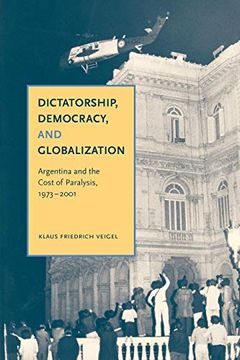Share
Dictatorship, Democracy, and Globalization: Argentina and the Cost of Paralysis, 1973-2001 (in English)
Klaus Friedrich Veigel (Author)
·
Penn State University Press
· Paperback
Dictatorship, Democracy, and Globalization: Argentina and the Cost of Paralysis, 1973-2001 (in English) - Klaus Friedrich Veigel
$ 35.37
$ 44.21
You save: $ 8.84
Choose the list to add your product or create one New List
✓ Product added successfully to the Wishlist.
Go to My WishlistsIt will be shipped from our warehouse between
Wednesday, June 05 and
Thursday, June 06.
You will receive it anywhere in United States between 1 and 3 business days after shipment.
Synopsis "Dictatorship, Democracy, and Globalization: Argentina and the Cost of Paralysis, 1973-2001 (in English)"
The collapse of the Argentine economy in 2001, involving the extraordinary default on $150 billion in debt, has been blamed variously on the failure of neoliberal policies or on the failure of the Argentine government to pursue those policies vigorously enough during the 1990s. But this is too myopic a view, Klaus Veigel contends, to provide a fully satisfactory explanation of how a country enjoying one of the highest standards of living at the end of the nineteenth century became a virtual economic basket case by the end of the twentieth. Veigel asks us to take the long view of Argentina’s efforts to re-create the conditions for stability and consensus that had brought such great success during the country’s first experience with globalization a century ago.The experience of war and depression in the late 1930s and early 1940s had discredited the earlier reliance on economic liberalism. In its place came a turn toward a corporatist system of interest representation and state-led, inward-oriented economic policies. But as major changes in the world economy heralded a new era of globalization in the late 1960s and early 1970s, the corporatist system broke down, and no social class or economic interest group was strong enough to create a new social consensus with respect to Argentina’s economic order and role in the world economy. The result was political paralysis leading to economic stagnation as both civilian and military governments oscillated between protectionism and liberalization in their economic policies, which finally brought the country to its nadir in 2001.
- 0% (0)
- 0% (0)
- 0% (0)
- 0% (0)
- 0% (0)
All books in our catalog are Original.
The book is written in English.
The binding of this edition is Paperback.
✓ Producto agregado correctamente al carro, Ir a Pagar.

